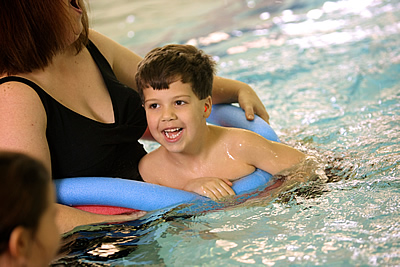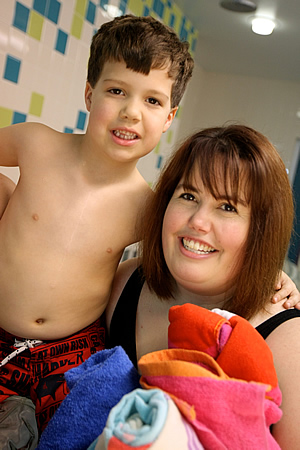Miracle Kids: Joshua Guest
A Boy Overcomes Rare Autoimmune Disease and is Standing Strong Again
 Gordon Guest didn’t think too much of it when Joshua, then 3, fell a few times one summer afternoon near their home in Dryden, N.Y. Kids often get clumsy during a growth spurt or when they’re tired. He brought Josh home and put him to bed early. But when Josh woke up the next morning, his eyes were pointing different directions and he had no facial expression.
Gordon Guest didn’t think too much of it when Joshua, then 3, fell a few times one summer afternoon near their home in Dryden, N.Y. Kids often get clumsy during a growth spurt or when they’re tired. He brought Josh home and put him to bed early. But when Josh woke up the next morning, his eyes were pointing different directions and he had no facial expression.
“He just looked like a different kid. He couldn’t swallow anything either,” Gordon said.
Gordon and Christine rushed their son to their pediatrician who sent Josh to Elmira for an MRI. The MRI didn’t reveal anything obvious, like a tumor or bleeding, but he was losing more coordination by the minute, so an ambulance was dispatched from Golisano Children’s Hospital at the University of Rochester Medical Center.
Josh was rushed to the Pediatric Intensive Care Unit (PICU) because his difficulty walking had progressed with startling rapidity to slurring his speech and having trouble breathing. It was becoming increasingly clear to Gordon and Christine that Josh was not going to make it to his birthday party the following Saturday, and his condition was very serious.
Christine said Josh had always been very strong, that he could hold himself up on his father’s outstretched arms as if they were parallel bars. “To go from a kid who was that strong to a kid who couldn’t hold his head up was really scary.”
After Josh stopped breathing twice, Gordon and Christine, who had both been emergency medical technicians (EMTs) earlier in life, readily agreed to having Josh intubated and attached to a ventilator. They knew the risks – he could develop pneumonia or become ventilator-dependent and never able to breathe on his own again – but they also knew their little boy would die otherwise.
“Once he was sedated and we were just there with him on a respirator… it sunk in,” Christine said. “You’re just helpless.”
But the Guests had a lot of support. Friends and family pitched in to take care of Josh’s big sister, Julia, who was 6 at the time. Gordon and Christine were invited to stay in the Ronald McDonald House within the Hospital, one floor above the PICU, so that when they could pry themselves from Josh’s bedside, they didn’t have to go far for some respite, a shower and a bite to eat. Gordon’s boss at Intertek, a product testing company, told him to do “whatever it takes” to get Josh well again.
Teams of neurologists, intensivists, nurses, fellows and residents visited Josh constantly, while Josh was kept sedated. On his birthday, Wendy Lane, coordinator of the Child Life program, brought Josh a bag full of presents, but he was so sick that his sister had to open them.
“It was still Joshua’s birthday – it didn’t matter that he was so sick,” Wendy said. “He and his family needed to celebrate and have some normalcy at an extremely difficult time.”
Joshua’s pediatric neurologists suspected he had a condition called myasthenia gravis, an autoimmune disorder that causes weakness by blocking acetylcholine receptors in the muscles. Essentially, the body’s immune system attacks its own muscles. But Josh’s blood test for the disease came back negative.
 Myasthenia is rare in adults (20 in 10,000 people) and it’s far rarer in children. As rare as it is, the University of Rochester Medical Center (URMC) has an expert in the condition who has treated almost a dozen pediatric patients. When Emma Ciafaloni, M.D., an associate professor of Neurology, met Joshua, she knew almost immediately that he had myasthenia gravis. About half of kids who have it have negative blood tests. She ordered an electromyography (EMG) test from URMC’s experienced EMG lab, which confirmed the diagnosis. A lab with less experience may have misdiagnosed Joshua and led him down the wrong treatment path.
Myasthenia is rare in adults (20 in 10,000 people) and it’s far rarer in children. As rare as it is, the University of Rochester Medical Center (URMC) has an expert in the condition who has treated almost a dozen pediatric patients. When Emma Ciafaloni, M.D., an associate professor of Neurology, met Joshua, she knew almost immediately that he had myasthenia gravis. About half of kids who have it have negative blood tests. She ordered an electromyography (EMG) test from URMC’s experienced EMG lab, which confirmed the diagnosis. A lab with less experience may have misdiagnosed Joshua and led him down the wrong treatment path.
Ciafaloni started Josh on steroids to suppress his immune system and Mestinon to treat his muscle weakness. He had a central line placed in his chest and experts at Wilmot Cancer Center used it for plasmapheresis. Much like dialysis, during plasmapheresis Josh’s blood was taken out of his body and the blood’s serum was cleaned before putting back the red blood cells. Almost immediately, he started to get stronger. But in order to return to his normal, energetic self, Josh needed his thymus gland surgically removed.
The thymus sits high in the chest, behind the sternum, and plays an important role in building the immune system prenatally and in babies. By about 12-months-old, the gland’s work is largely done. In rare cases, it can go haywire, causing the immune system to turn on itself and attack nerves. Plasmapheresis and the medications would help Josh, but what he really needed was a thymectomy.
After 18 days and a couple complications, Joshua could finally breathe on his own. He could take rides down to the indoor-outdoor play area, called the Play Deck, although he tired easily.
“By the time we’d get back, he couldn’t hold his head up,” Gordon said.
The same muscle weakness that made it hard for Josh to breathe also made it difficult for him to swallow without choking. He was finally cleared to have food. It had been five weeks since he last ate. The family celebrated with a trip to the Seneca Park Zoo. His sister Julia had taken a couple trips to The Strong – National Museum of Play, but this would be Josh’s first trip out. The hospital gave Josh a day pass and Child Life sent the family with tickets and a special wagon to pull him around.
On Sept. 14, 2009, six weeks after Josh first got sick, surgeons removed his thymus. Because of its location, he had to have his chest opened as if he were having heart surgery. He struggled with pain afterward, but once his pain was under control, he improved as rapidly as he had gotten sick. Josh was well enough to go home six days later. Within two weeks, Josh was back on his bicycle.
Ciafaloni said Josh has been doing very well. He hasn’t needed steroids to suppress his immune system since the summer of 2010. If his immune system continues to behave itself, he’ll soon be declared in full remission.
“He’s a very affectionate, hugging and smart kid,” Ciafaloni said. “And he sure has a contagious smile!”
For all he’s been through, that may be the most remarkable thing of all.
“This is Medicine of the Highest Order. Truly.”